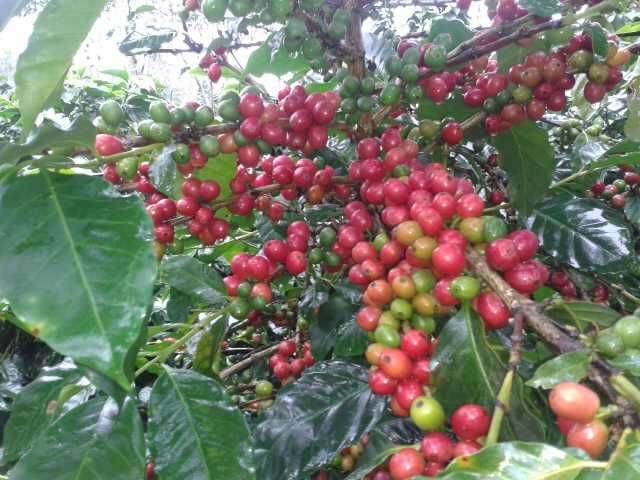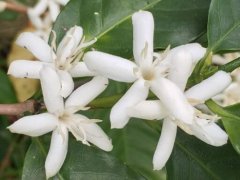What about the procedures for the entry list of imported coffee beans? can raw coffee beans go through customs

Professional coffee knowledge exchange more coffee bean information please follow the coffee workshop (Wechat official account cafe_style)
Coffee beans refer to the plant fruits used to make coffee. In a broad sense, there are two kinds of coffee beans in the world, Arabica beans and Robosta beans. The fruit of coffee consists of two oval seeds opposite each other. The connecting side of each other is a flat joint, which is called flat bean. But there is also a round seed called a round bean, which tastes no different.
Customs declaration procedures for the import of coffee beans
1. The record number of the consignee and consignor
2. The original label and the corresponding Chinese translation
3. Import and export rights
4. Food circulation license
5. Certificate of origin
6. Health certificate of producing country / certificate of free sale
7. Manufacturer's composition testing report
9. Animal and plant inspection certificate
9. Packing list, invoice and contract, etc.
Product information: product name, quantity, packaging, weight and volume, etc.
Coffee bean import entry catalogue
Coffee beans that have been roasted are not required to enter, only those that are raw are needed!
Unroasted and shelled coffee (Coffea arabica L.) seeds (excluding endocarp). According to the access list, coffee beans from 41 countries and regions currently have access.
Business editor: 0901110000 0901120000, prior inspection and quarantine examination and approval is required before import.
We now take the Bolivian coffee beans recently approved for entry as an example, the inspection and quarantine requirements are as follows
Inspection and quarantine requirements for imported Bolivian coffee beans
I. basis for inspection and quarantine
(1) Law of the people's Republic of China on entry and exit Animal and Plant Quarantine, regulations on the implementation of the Law of the people's Republic of China on entry and exit Animal and Plant Quarantine, Law of the people's Republic of China on Import and Export Commodity Inspection, regulations on the implementation of the Import and Export Commodity Inspection Law of the people's Republic of China, Food Safety Law of the people's Republic of China regulations on the implementation of the Food Safety Law of the people's Republic of China
(2) measures for the Administration of Import and Export Food Safety
(3) Protocol between the General Administration of Customs of the people's Republic of China and the Ministry of Rural Development and Land of the Plurinational State of Bolivia on phytosanitary requirements for Bolivian coffee beans exported to China.
Products that are allowed to enter the country
Bolivian coffee beans refer to unroasted and shelled coffee (Coffea arabica L.) grains (excluding endocarp) grown and processed in Bolivia.
III. Requirements of enterprises
The production and processing enterprises of Bolivian coffee beans exported to China must meet the plant quarantine requirements of China, be registered and recommended by the competent authorities of Bolivia, and approved and registered by the General Administration of Customs. The enterprise registration list can be found on the website of the General Administration of Customs.
IV. Phytosanitary requirements
(1) the coffee beans imported from Bolivia to China shall comply with the requirements of China's imported plant inspection and quarantine laws and regulations, and shall not contain soil, weed seeds, other grains and plant residues, etc.
(2) Bolivian coffee beans exported to China should not contain quarantine pests of Chinese concern: coffee bark beetle Hypothenemus hampei (Ferrari).
(3) the coffee beans imported from Bolivia should be fumigated with phosphine at 18 ℃-23 ℃, and the dosage of phosphine is 57% aluminum phosphide 6g/m3 or phosphine 2g/m3. The fumigation time is 168h.
V. requirements for phytosanitary certificates
Bolivian coffee beans exported to China must be accompanied by Bolivia's official phytosanitary certificate. The declaration column of the certificate should indicate that "the goods meet the requirements of the Protocol on Plant Quarantine requirements for Bolivian Coffee beans exported to China" signed by China and Bolivia in Beijing on June 19, 2018.
VI. Food safety requirements
Bolivian coffee beans exported to China must meet the requirements of Chinese laws and regulations and relevant national standards for food safety.
VII. Packaging and transport requirements
Bolivian coffee beans exported to China must be packed with clean, hygienic, breathable and new materials that meet China's phytosanitary requirements. Each package should be marked with the words "this product is exported to the people's Republic of China" and Chinese information that can identify the product name, processing plant, exporter name and address of the coffee bean.
As the raw coffee bean is a plant fruit seed, it is easy to contain coffee fruit bark beetle, Fusarium and other pests. Especially the coffee bark beetle, which is native to Africa, harms the fruits and seeds of coffee plants, and even spreads over a long distance with coffee fruits and coffee beans, which is easy to cause harm to crops, such as yield reduction, quality reduction and so on.
Every country that imports raw beans will have agricultural product quarantine departments to prevent insect eggs and biological bacteria from other countries from clinging to agricultural products and causing damage to local crops. With the exception of China, when importing raw coffee beans, they must go through customs quarantine and confirm that there are no eggs or germs before they can pass.
Relevant provisions:
The list of animals, plants and their products forbidden to be carried or mailed by the people's Republic of China lists raw coffee beans and other plant materials with reproductive ability as entry objects forbidden to be carried or mailed in China, and entry is strictly prohibited without quarantine.
The Law of the people's Republic of China on entry and exit Animal and Plant Quarantine and its implementing regulations clearly stipulate that it is forbidden to bring into the country fresh fruits, vegetables, meat (including organs) and their products, aquatic animal products, milk and dairy products, bird's nests, eggs and their products, seeds, seedlings and other products. If you carry the above-mentioned articles, when going through the inspection and quarantine formalities, you should take the initiative to declare to the inspection and quarantine organ in advance and hand it over to the inspection and quarantine personnel for handling. Violators will return or destroy the items they carry. If it causes a major animal and plant epidemic, it will be investigated for criminal responsibility according to law; if the crime does not constitute a crime or the circumstances of the crime are significantly minor and do not need to be sentenced according to law, the entry and exit inspection and quarantine organ shall impose a fine of not less than 20,000 yuan but not more than 50,000 yuan.
END
Important Notice :
前街咖啡 FrontStreet Coffee has moved to new addredd:
FrontStreet Coffee Address: 315,Donghua East Road,GuangZhou
Tel:020 38364473
- Prev

How to find imported coffee bean suppliers? what are the coffee bean suppliers in Beijing, Guangzhou and Shanghai?
Professional coffee knowledge exchange more coffee bean information please pay attention to the coffee workshop (Wechat official account cafe_style) coffee bean suppliers are also increasing the supply and demand of imported coffee beans, and then the editor sorted out some points for attention on imported coffee beans customs declaration: first, the qualifications of imported coffee beans 1. Before importing coffee beans, we should see if the company has made any progress.
- Next

Which brand of coffee is good to buy coffee online? what coffee sells well online?-Coffee bought online for the first time
For more information on coffee beans, please follow the coffee workshop (Wechat official account cafe_style) producing list, taste list, beverage list 1. First of all, Malaysia, Italy, and Yunnan of China are the winners in terms of coffee production. Judging from the 11-month monthly growth rate, Vietnam's Saigon, Australia and France have emerged as a new force, so you can give it a try. Such as
Related
- Beginners will see the "Coffee pull flower" guide!
- What is the difference between ice blog purified milk and ordinary milk coffee?
- Why is the Philippines the largest producer of crops in Liberia?
- For coffee extraction, should the fine powder be retained?
- How does extracted espresso fill pressed powder? How much strength does it take to press the powder?
- How to make jasmine cold extract coffee? Is the jasmine + latte good?
- Will this little toy really make the coffee taste better? How does Lily Drip affect coffee extraction?
- Will the action of slapping the filter cup also affect coffee extraction?
- What's the difference between powder-to-water ratio and powder-to-liquid ratio?
- What is the Ethiopian local species? What does it have to do with Heirloom native species?

